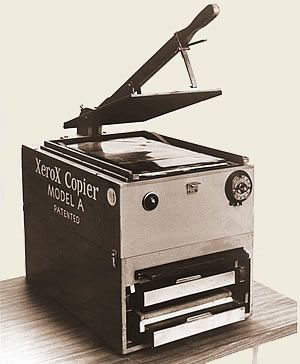Model A copier
In 1949, the Haloid Company produced its first copying machine. It was called the Model A. During development it was
Read More In the period from 1949 to 1950, when the Xerox 914 copier was introduced to the world, Haloid/Haloid Xerox produced several machines in their quest to improve the xerographic process. The products created were machines that required several manual operations to make a copy. The first model that comes to mind is the Model A copier, which was improved in other versions that were unofficially called Model B and Model C. In 1951 came the Model D, with even more improvements. Some of the other equipment that was also produced was the Flat-plate 1385. This was a piece of equipment that also required manual operations, and was therefore sold as a platemaker for the Addressograph-Multigraph Multilith 1250 and related sheetfed offset presses in the offset lithography market.
In the period from 1949 to 1950, when the Xerox 914 copier was introduced to the world, Haloid/Haloid Xerox produced several machines in their quest to improve the xerographic process. The products created were machines that required several manual operations to make a copy. The first model that comes to mind is the Model A copier, which was improved in other versions that were unofficially called Model B and Model C. In 1951 came the Model D, with even more improvements. Some of the other equipment that was also produced was the Flat-plate 1385. This was a piece of equipment that also required manual operations, and was therefore sold as a platemaker for the Addressograph-Multigraph Multilith 1250 and related sheetfed offset presses in the offset lithography market.
It was little more than a high-quality, commercially available plate camera mounted as a horizontal rostrum camera, complete with photoflow lighting and timer. The glass film/plate was replaced with a selenium-coated aluminum plate. Using smart electricity, this became a fast developing and reusable replacement for film. A skilled user could quickly produce paper and metal plates of higher quality than almost any other method. Xerox, which had started out as a supplier to the offset printing industry, now set out to capture some of offset’s market share.
In this section of the website, we will focus on the products that was manufactured before the Xerox 914 was introduced.
In 1949, the Haloid Company produced its first copying machine. It was called the Model A. During development it was
Read MoreFrom 1939 to 1944 Chester Carlson visited several companies to show his first xerographic apparatus. This was some sort of
Read MoreIn 1950 Haloid announced the Xerox Standard Equipment. It consists of the Xerox camera No. 4, Processord “D” and a
Read More